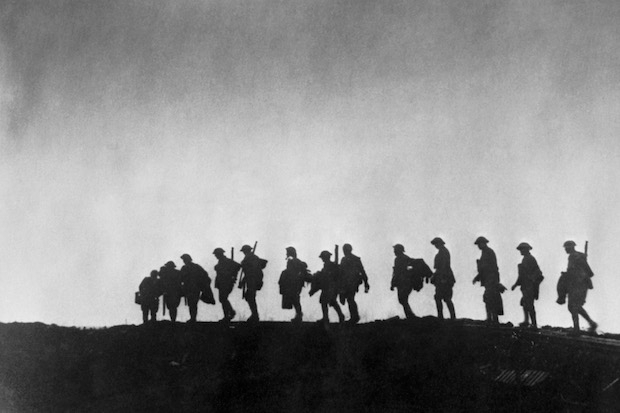From ‘The End of the First Year‘, The Spectator, 7 August 1915:
Terrible as have been the sufferings caused by the war—the agonies of the body for those who have fought and fallen wounded, and the agonies of the mind for those who have seen husbands, fathers, and sons go to their deaths or return maimed or ruined in health—the present writer cannot feel that sense of overmastering horror which the war seems to have inspired in certain minds. Some have been carried away so far by such thoughts that they tell us they wish their eyes had been closed for ever before the national tragedy began. The present writer can take up no such attitude as regards the war. On the contrary, he feels grateful beyond measure that he has been spared to see the heroism of the nation and to watch, even though he has been unable to take part in it, the glorious answer to the call of duty. He has seen with what majesty the British soldier fights, how our men go to their graves like beds, how they bear mutilation and pain as if it were but some trivial accident of life, how they keep their smiles for the foe, their tears for their dead comrades and their tenderness for home. He has seen, too, how the people willingly offered themselves to sustain the national faith and the national honour—to give security for the present and peace for the future. Lastly, he has seen how our countrywomen, hardest trial of all, have sent their men to the front without one word that might discourage or detain them. Our women, at any rate, have not been shirkers. They, have sustained and inspired the men. Every mother of fighting sons, every wife of a soldier, every sweetheart of a man at the front, deserves the nation’s’ deepest gratitude. It has been good to be alive in such times. It has been a privilege great beyond words to see how the nation has thrown off the idle lendings and the luxuries of peace, and how our people have flown to arms without a thought of the dangers and hardships they would have to face. Remember that we have not been able to ask our people, as our Allies in France and Russia and Italy have done, to take their places in their old regiments and to exercise the arts of war which they learnt when they were young men. We have had to ask our new soldiers, rich and poor, to begin with six months of military drudgery—six mouths of hard education in the art of war—and to learn these war lessons very often under real hardships in the way of bad shelter and indifferent food. But no difficulties of this kind have interfered with the nation’s resolve. A nobler proof of our people’s great-heartedness could not have been found. Therefore once more the present writer must say that he is thankful that he has lived to see what he has seen, to hear what he has heard—to witness, if not to share physically in, the self-sacrifice of the British people. Truly theirs is the mens aequa rebus in arduis—the steadfast heart be the peril never so great. Who would not be proud to belong to such a people? Who would not be thankful that his eyes have been allowed to behold the incomparable glory of his native land?






Comments